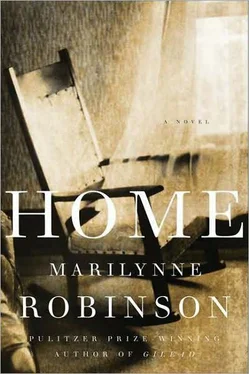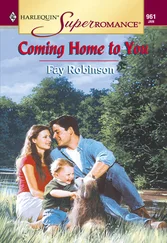Oh, she thought, dear God, let that be true! How to warn him. How to warn either of them. Jack would be walking into an embarrassment she had prepared for him. When Ames said to her, It would be a pity, his voice had a hint of that taut patience with which he had always heard out tales of Jack’s scoundrelism. And Jack had a way of conceding ground he could not defend, taking on a manner of evasive deference when he felt he might be seen as a shady character, which meant that he certainly would be seen that way, however bright the shine on his shoes. That weary smile of his, as if he knew that between him and anyone he spoke to there was none of the trust that sustained the most ordinary conversation, as if between them there was an uneasy mutual understanding that almost obviated words. The jaded intimacy in his assuming so much seemed to startle people. Still, he had to assure himself that his last spark of hope was extinguished, so he checked the knot of his tie and tipped his hat, and went off to find Ames at his church.
Glory looked in on her father, and finding him still asleep, she went up to her room, got down on her knees, and prayed fervently in the only words that came to her—“Dear God in heaven, help him. Dear God in heaven, protect him. Please don’t let him suffer for my stupidity, dear God, please.” Then she lay on her bed and thought. More precisely, she fell to remembering something she had almost forbidden herself to remember. Something it seemed she had now fully and finally given up, though it had never been hers. A modest sunlit house, everything in it spare and functional, airy. Nothing imposing about it at all. In front a picture window looking out on a garden, a patio in back. The kitchen would be spacious and sunlit, with a white painted table, no, a breakfast nook, where morning light would fall on it. Sometimes she had talked about this house with the fiancé, and they had been in such agreement, they were so much of one mind, that it was amazing to them. No gilt frames, no beetling cornices. She had mentioned children, and he had said they would have to be very practical the first few years, there was time enough to think about children. So she imagined the children playing quietly, tiptoeing in from the patio now and then to whisper a secret or open a hand to show her an interesting pebble, then back out the door again so quietly, because Papa must not be disturbed. He must not know they were there at all. She had names for them, which drifted among them, and changed, as did certain of their attributes, ages, gender, number. For a few weeks one or another of them had a stammer, because she had spoken with a child at school who stammered, a sweet child. But then they were infants again, no traits particular to them yet, happy to lie in her arms. They wore flannel pajamas every cool night, and in her fantasies she sang to them the ballad of lost children. “The robins so red brought strawberry leaves and over them spread.” They would weep in her arms and love her more, since she would keep them safe forever from abandonment and all bitter loss. She might have had doubts about dropping this tincture of sorrow into their hearts if they had been real children, though for herself she never could regret that her sisters had sung to her, making her feel so sharply the steadfast and effectual care of her family, while the great wind roared in the trees and rattled the windows. That wind, they all knew, could sweep up a town and scatter it hither and yon, houses and cattle and children. Robins so red. The words were bright as a prick of blood.
The fiancé had a habit of sitting with his heels together and his toes pointing outward. This was truer when he wished to seem content or ingratiating. She could never help feeling this meant something disheartening about him that would not be fixed even if she sometime mentioned to him that he might arrange his feet more gracefully and he complied. If she gave him a cup of coffee, he would lean there, elbows on his knees, holding the saucer under the cup, and he would grin at her, and those feet would seem to mimic the grin, which was excessive in itself. He told her she was a snob about her family, and that was true. And not without reason. They were all graceful people after their shambling style, and they did not grin.
The fact was, all the same, that she would have married him, that for years she had had no other intention, except when doubts emerged that reduced intention to hope. How miserable that was to remember, and how miserable the relief when a letter came, the phone rang, she heard his knock at the door. He was a pleasant-looking man, robust and ruddy, with clear blue eyes and red hair that crinkled against his scalp. If in person he did not altogether answer to the idea of him she took from his letters, he was agreeable enough. Sometimes he made her laugh. She would almost like to know how much money she had given him, only to be able to gauge the depth of an infatuation that seemed so remote to her now. It was for the children and the sunlit house that she had been diligent at discerning virtues and suppressing doubts, ready to give up mere money if it could put aside the obstacles to her happiness, or if it could keep the thought of happiness safe from disruption. God bless him, Jack had understood it all and laughed, a painful but companionable laugh, as if they’d been whiling away perdition together, telling tales of what got them there, to forestall tedium and the dread of what might come next. The sweet thought of sunlight and children she had cherished in secret was now utterly dispelled. No, she wanted to tell Jack about them, to dispel them, as if they were spirits of the kind that perish in daylight. But for that reason she could not and never would betray them. Let some sleep of oblivion overtake them, finally.
So Glory would live out her life in a place all the rest of them called home, a place they would mean to return to more often than they did. If she spoke discreetly to the high school principal about the fact that the marriage she intended had not in fact taken place, the information would pass through town and be absorbed and cease to be of particular interest. She could start teaching again.
She heard Jack walk into the kitchen, put his hat on the refrigerator. She heard him go down the hall, speak to his father, then come back to fill a glass with water and take it to him. After a few minutes, he went to the piano and began to play a hymn. “‘When all my trials and troubles are o’er, and I awake on that beautiful shore.’” Things must have gone well enough, thank God. So she went downstairs.
When he had finished the hymn he turned and looked at her. “It wasn’t bad,” he said softly. “He was very kind. He couldn’t do anything for me, but he was kind. It was all right. Better than I expected, really. Ames’s heart is failing, he said, so he won’t be around much longer. I thought he might, I don’t know, vouch for me. Help me overcome my reputation. But I have to leave here anyway. I don’t know why I bothered him.” He shrugged.
She said, “I’m glad it was a good conversation.”
He nodded. “I called him Papa, and this time I think it may even have pleased him a little.” He smiled to himself, and then he said, “I told him almost everything, and when I was done he said, ‘You are a good man.’ Imagine that.”
“Well, I could have told you you are a good man. I’ve said it in so many words, surely.”
He laughed. “You’re a miserable judge of character. Mine, especially. No objectivity at all.”
WHEN THEY HEARD THEIR FATHER STIR AND WAKE, JACK carried him to his chair on the porch and settled the quilt around him and read to him from the newspaper while Glory made potato soup almost the way he had always liked it, without onions but with butter melted into it and crackers crumbled on top. Jack fed him, held his cup for him. The old man accepted these attentions without comment. Then Jack changed into his work clothes and went out to the garden, where his father could watch him, as it seemed he did until he began to doze off. After a little while Jack came back and found him asleep and carried him to bed again, slipping the crooked body out of the robe with great care. It seemed to her there was a peacefulness about him that came with resignation, with the extinction of that last hope, like a perfect humility undistracted by the possible, the unrealized, the yet to be determined. He worked on the DeSoto, then sat in the porch and read till the sun went down. He went out for a stroll, just to look at the place, he said, and came back in an hour, stone sober. It may have been the saddest day of her life, one of the saddest of his. And yet, all in all, it wasn’t a bad day.
Читать дальше












